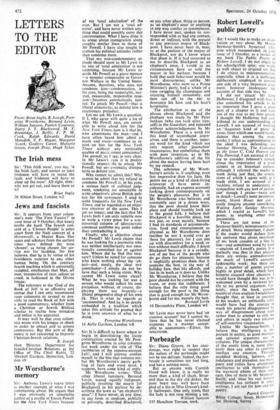Robert Lowell's public poetry
Sir: I would like to make an obser- vation or two about Mr Martin Seymour-Smith's hysterical effu- sion which masqueraded, in your issue of 3 October, as a review of my book The Public Poetry of Robert Lowell. I do not object to his schoolgirlish spite: one might as well object to original sin. But I doobject to misrepresentation, especially when it is a technique deliberately employed to conceal one side of a very important argu- ment. however inadequate my account of that side may be.
I did not 'attack' Mr John Holloway; I disagreed with him. I also considered his article to be so important that I gave a great part of a chapter to it and went
out of my way to my how greatly
I thought Mr Holloway had con- tributed to our understanding of Lowell. I am accused of wanting an 'Augustan kind of prose' in verse, from which one would hardly deduce that among the many works I select as approximating to the ideal I was defending, are Sunday Morning, The Comedian as the letter C. Cold Heaven and The Dunciad. I am accused of fail- ing to consider Johnson's remark about the importance of a great subiet in an historical context. although I referred the reader to work doing just that, the conclu- sions of which I agree with, as I made plain. I am accused of a 'reckless refusal to understand or sympathise with any sort of pessim ism' though I praise—twice and in detail—Lowell's most pessimistic poem, Skunk Hour, nor can I easily imagine anyone considering Waking Early Sunday Morning. which I regard as Lowell's best poem,as anything other than pessimistic.
These are just some of Mr
Seymour-Smith's misrepresentations of detail. More important, I doubt if the reader would deduce from his outburst that about two-thirds of my book consists of a line by line—and sometimes word by word —analysis of Lowell's poetry It is perfectly true that in that analysis there are serious animadversions on much of Lowell's currently fashionable work; but there are also a number of poems praised highly in great detail, which have hitherto escaped close attention. I would have thought this was to be welcomed even by a reviewer hos- tile to my general argument. Cer- tainly, since the book consists mainlyof close analysis 'would have thought that, at least in courtesy his readers, an unfriendly critic
would have had the courage to reach his general disagreement by way of disagreement about texts rather than to attempt to sink me and others in nearly two columns of self-assertive vituperation. Unlike Mr Seymour-Smith.
believe that intelligence is Im- portant in poetry, as good manners and rational argument are in criticism. The unique characteristic of the poetic form is, more effec- tively than any other to combine intellect and emotion. Through muddled thinking, laziness, self- indulgence and prejudice, too many poets and critics have abandoned intelligence to sink themselves in the wayward whims of their own egos. One of them is Mr Seymour- Smith: and, since his real natural intelligence has surfaced in other writings, I am sad for him and for poetry. Patrick
Dorking. Surrey South C thrHk Holmu00', White Cottage, ood,














































 Previous page
Previous page